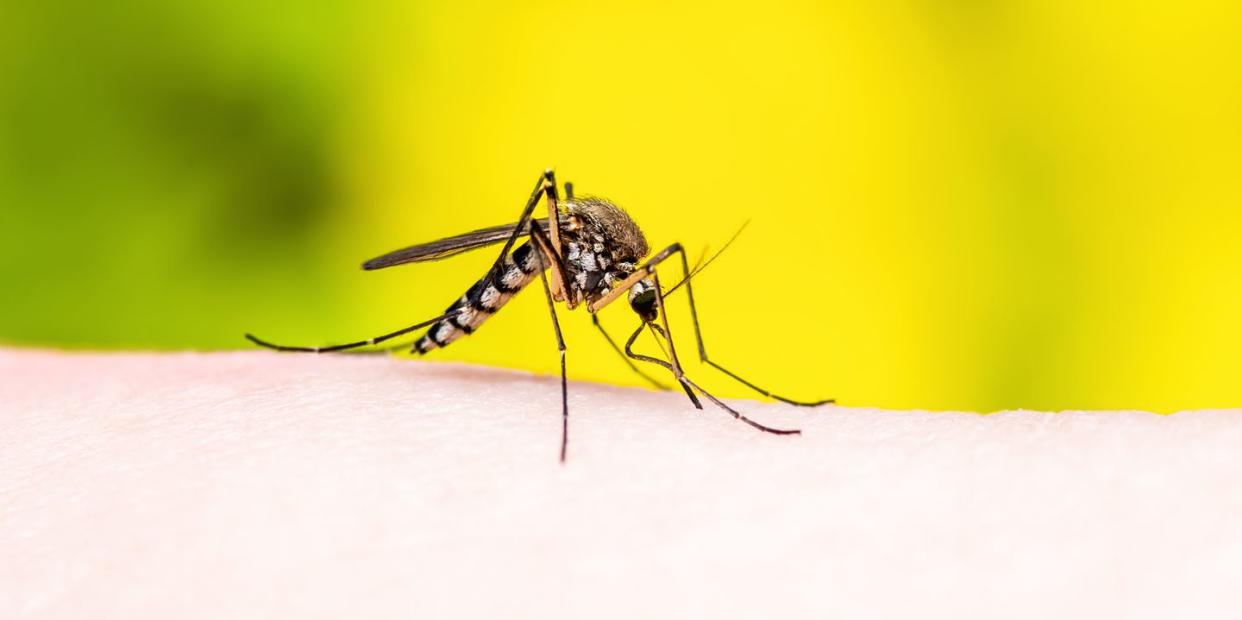What Is Jamestown Canyon Virus, the Rare Mosquito-Borne Infection Confirmed in New Jersey?

A man in New Jersey has been diagnosed with Jamestown Canyon virus (JCV), a rare and serious mosquito-borne infection.
Many JCV illnesses are mild, but moderate-to-severe symptoms can impact a person’s central nervous system.
Infectious disease experts stress the importance of preventing mosquito bites this summer.
A man in New Jersey has been diagnosed with a rare and serious mosquito-borne infection, state health officials announced on Wednesday. The 60-year-old man, who has not been publicly identified, tested positive for Jamestown Canyon virus (JCV) after developing a fever and neurological issues in May. Public health officials didn’t reveal how the man is doing now.
JCV is a potentially deadly virus that circulates mostly between deer and mosquitoes, but can also spread to people through an infected bite, according to the Centers for Disease Control and Prevention (CDC). Many illnesses caused by JCV are “mild,” per the New Jersey Department of Health, but “moderate-to-severe” infections can impact a person’s central nervous system and require hospitalization.
The virus is found all over the U.S., but most cases are reported in the upper Midwest, with the majority happening from late spring through mid-fall.
If Jamestown Canyon virus hasn’t been on your radar until now, you’re not alone. This virus is much less common than other mosquito-borne diseases like West Nile virus, Chikungunya, and Zika virus. Here’s everything you need to know to stay safe this summer.
What are the signs and symptoms of Jamestown Canyon virus?
Most people who are infected with JCV do not have symptoms, the CDC says. Those who do will usually start to feel sick anywhere from a few days to two weeks after being bitten by an infected mosquito. Symptoms are usually broken into the initial phase and more severe disease, if it develops.
Symptoms of the initial phase include:
Fever
Fatigue
Headache
Cough
Sore throat
Runny nose
The virus can cause more severe disease, including encephalitis (an infection of the brain) or meningitis (an infection of the membranes around the brain). Those symptoms include:
Stiff neck
Confusion
Loss of coordination
Difficulty speaking
Seizures
About half of patients with reported cases of JCV disease are hospitalized, the CDC says.
How common is Jamestown Canyon virus?
The CDC says that an average of 15 severe cases of the virus are documented each year. However, there is a “significant under-diagnosis and under-reporting of less severe cases,” the agency adds.
“It’s important for people to realize that many people are infected with this virus and either have no symptoms or have very mild, nonspecific symptoms,” says Thomas Russo, M.D., professor and chief of infectious disease at the University at Buffalo in New York. “Progression of the virus to more severe disease involving the brain probably represents a small fraction of individuals who are infected.”
How worried should you be about Jamestown Canyon virus? What’s the best way to stay safe?
Infectious disease experts say people shouldn’t panic over this virus. “You don’t need to be concerned,” says William Schaffner, M.D., an infectious disease specialist and professor at the Vanderbilt University School of Medicine. “It’s not thought to be common, nor is there a history of this virus causing outbreaks.”
Amesh A. Adalja, M.D., senior scholar at the Johns Hopkins Center for Health Security, agrees. “However, it is really important to be wary of mosquitoes and take adequate protective measures when in a mosquito-laden area,” he adds.
Per the CDC, that includes taking precautionary steps to prevent mosquito bites:
Use EPA-registered insect repellent, which generally includes active ingredients like DEET, picaridin, and oil of lemon eucalyptus. (Find a list of our favorites here.)
Wear tightly woven, light-colored long sleeve shirts and pants when you’re going into areas that have big mosquito populations.
Avoid peak mosquito hours, dawn and dusk, when possible.
Use screens on windows and doors and air conditioning when possible.
Empty areas around your home that can hold water, like buckets, birdbaths, and children’s toys, which attract mosquitoes to lay eggs in.
If you develop unusual symptoms in the summer or after any bug bite, call your doctor. While Dr. Schaffner says it’s more likely that your illness is due to something other than JCV, he points out that, “if you’re feeling crummy, you should always see your healthcare provider” to ensure a proper diagnosis and speedy treatment.
You Might Also Like

